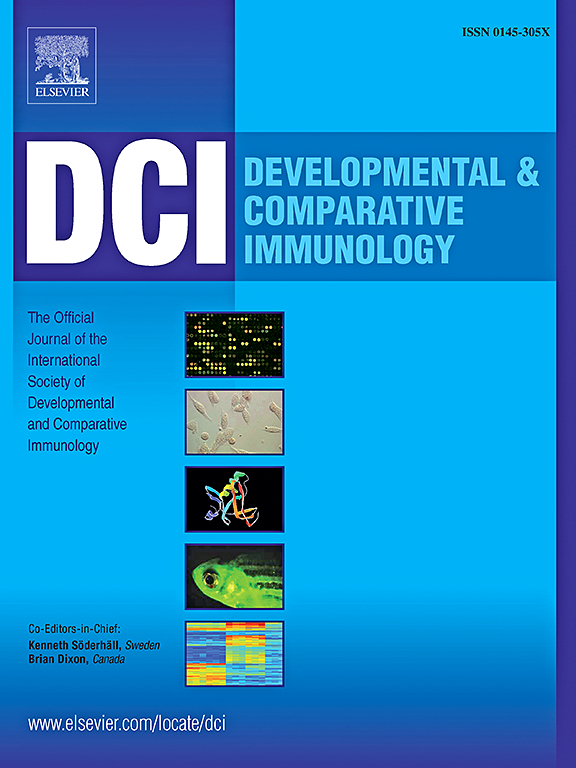Effect of Bacillus subtilis and fungal enzymes on immune responses and gut microbiota of masu salmon (Oncorhynchus masou masou)
IF 2.4
3区 农林科学
Q1 FISHERIES
引用次数: 0
Abstract
The effects of oral administration of probiotics Bacillus subtilis (BS) and Aspergillus sojae-fermented materials (AFM) supplementation on immune responses and the gut microbiome of masu salmon Oncorhynchus masou masou were evaluated. Masu salmon (44.07 ± 7.1 g) were individually raised on a commercial diet without supplementation (control group), with B. subtilis strain DB9011 at 1.0 × 106 cfu/g-feed (BS group), and with A. sojae-fermented materials supplementation at 0.2 % (AFM group) for 24 days. Lysozyme activity in fish serum was determined using turbidimetric assays. Immune-related gene expression and gut microbiota were analyzed through real-time PCR and metagenomics analysis with a next-generation sequencer, respectively. Both the BS and AFM groups showed higher lysozyme activity but lower serum protein concentrations compared to the control group without significant different. The gut bacterial composition in the BS and AFM groups was dramatically different compared to that in the control group. The alpha diversity of the BS group showed significantly greater richness in terms of Chao1, faith_pb, and shannon_entropy. Conversely, the alpha diversity of the AFM group showed significantly greater richness only on faith_pb. The expression of immune-related genes such as TNF-α and IFN-γ was upregulated in the treatment group compared to the control group. IL1-β was upregulated in the AFM group. Regarding IL1-β, no differences were observed between the control and BS group. Thus, results indicated that oral administration of the BS and AFM modify gut microbiota and stimulated the expression of immune-gene expression.
枯草芽孢杆菌和真菌酶对鲑鱼免疫反应和肠道菌群的影响。
研究了口服益生菌枯草芽孢杆菌(Bacillus subtilis, BS)和大豆曲霉发酵物(Aspergillus sozae -酵剂,AFM)对马苏鲑(Oncorhynchus masou masou)免疫应答和肠道菌群的影响。选取马苏鲑鱼(44.07±7.1 g),分别饲喂不添加饲料(对照组)、添加枯草芽孢杆菌菌株DB9011 (1.0 × 106 cfu/g)饲料(BS组)和添加大豆芽孢杆菌发酵料(0.2% AFM组),饲养24 d。用浊度法测定鱼血清中溶菌酶活性。免疫相关基因表达和肠道菌群分别通过实时荧光定量PCR和宏基因组测序仪进行分析。与对照组相比,BS组和AFM组溶菌酶活性较高,血清蛋白浓度较低,但差异不显著。与对照组相比,BS组和AFM组的肠道细菌组成有显著差异。在Chao1、faith_pb和shannon_entropy上,BS类群的α多样性丰富度显著高于其他类群。相反,AFM组的α多样性仅在faith_pb上表现出显著的丰富度。与对照组相比,治疗组免疫相关基因TNF-α、IFN-γ表达上调。AFM组il - 1-β表达上调。关于il - 1-β,对照组和BS组之间无差异。因此,结果表明,口服BS和AFM可以改变肠道菌群,刺激免疫基因的表达。
本文章由计算机程序翻译,如有差异,请以英文原文为准。
求助全文
约1分钟内获得全文
求助全文
来源期刊
CiteScore
6.20
自引率
6.90%
发文量
206
审稿时长
49 days
期刊介绍:
Developmental and Comparative Immunology (DCI) is an international journal that publishes articles describing original research in all areas of immunology, including comparative aspects of immunity and the evolution and development of the immune system. Manuscripts describing studies of immune systems in both vertebrates and invertebrates are welcome. All levels of immunological investigations are appropriate: organismal, cellular, biochemical and molecular genetics, extending to such fields as aging of the immune system, interaction between the immune and neuroendocrine system and intestinal immunity.

 求助内容:
求助内容: 应助结果提醒方式:
应助结果提醒方式:


